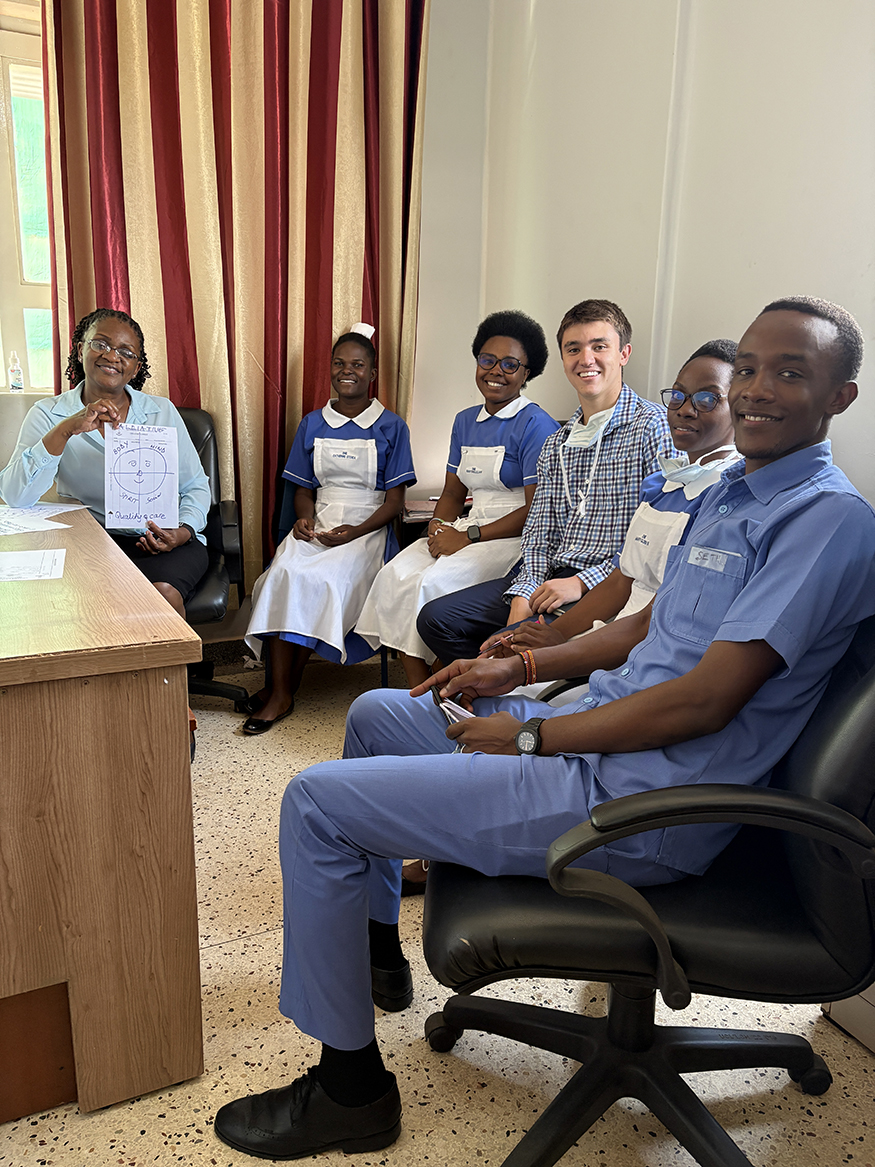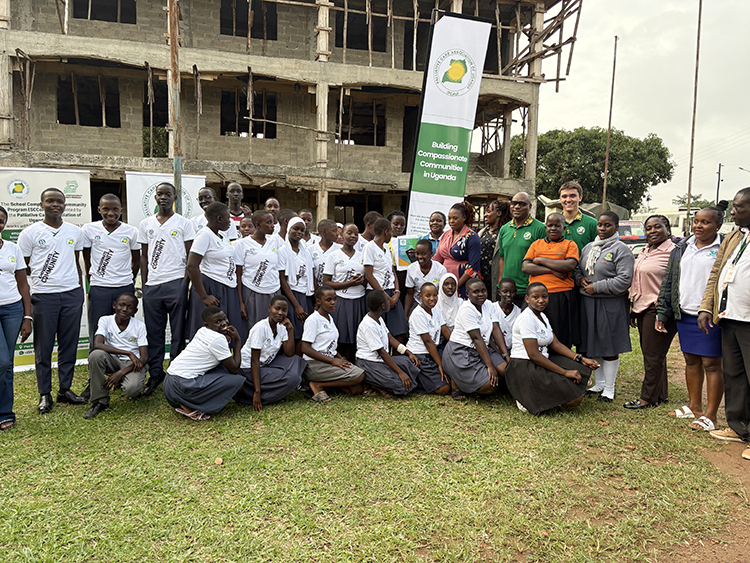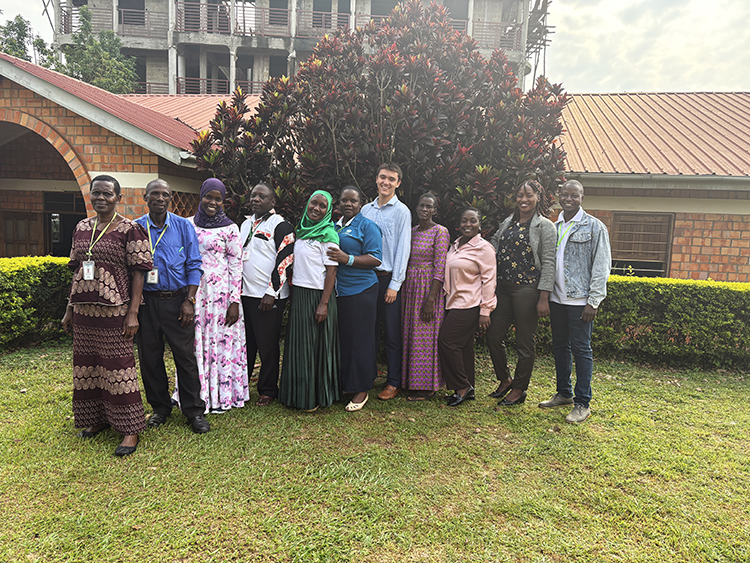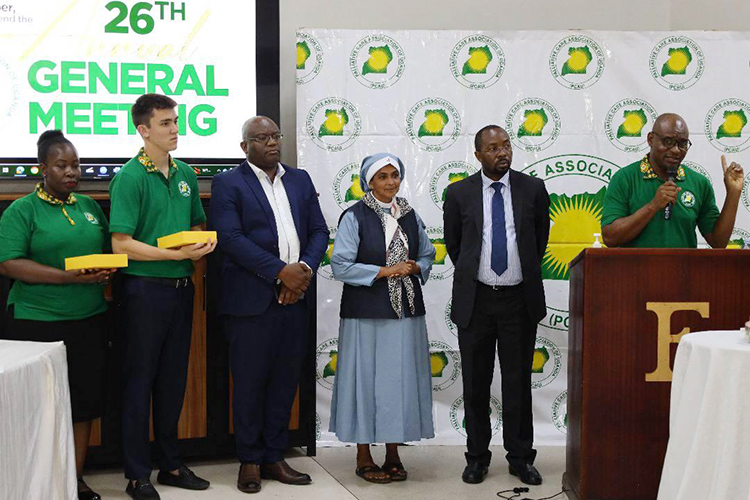A Reflection from Noah Lim, GPIC Intern
“I didn’t know it would be this hard.” The late Dr. Anne Merriman whispered this phrase as she lay surrounded by loved ones, death looming near. Chris Merriman, her cousin, repeated these words at her burial service, thanking the larger palliative care fraternity for their gift of healing and the peace they provided. After many joyful stories and heartwarming patient testimonies, I knew I would be in for the experience of a lifetime.

This summer, I spent seven weeks completing an internship with the Palliative Care Association of Uganda (PCAU) and Global Partners in Care (GPIC). Primarily focusing on PCAU’s new spiritual care assessment tool (SCAT), I also supported PCAU in their School Compassionate Communities Program (SCCoP). Studying theology on the pre-medical track at Notre Dame, this internship was not only the perfect opportunity to learn about true, holistic, compassionate care, but also to explore the intersection of my two interests: spirituality and medicine.
I arrived in Uganda to start my internship just in time to attend the vigil and burial ceremony of Dr. Merriman. The PCAU team and I then made a quick transition into preparation for the upcoming 2025 Annual General Meeting (AGM). While primarily assisting with marketing and communications during the meeting, I learned to align goals with audience needs, coordinate effectively with others, and creatively meet objectives. Having never hosted an event of such magnitude, it was both insightful and exciting to be a part of the careful planning and execution.
Following the AGM, I departed for my two-week stay in Hoima, Uganda. I visited Little Hospice Hoima (LHH), a branch of Hospice Africa Uganda, because it piloted PCAU’s new SCAT. Traveling for hours with the LHH team to reach patients in their homes, I saw that compassionate care was reaching even those with the most limited access. While the medicine offered physical relief, I was struck by the deeper sense of peace patients experienced through the loving presence of the LHH team. Following the example of LHH, I will be ever more aware of those facing the greatest healthcare barriers and will work towards bringing not only healing, but also human connection.


While I studied spirituality in the classroom, I was excited to observe it in a clinical setting for the first time. In the face of death, patients grapple with questions that probe at our very existence. Providers navigated not only individual spirituality and religious beliefs, but also cultural practices. It was fascinating to observe. In these moments, the deep interconnectedness of the mind, body and spirit of a human being became strikingly clear. Providers didn’t always have the perfect answers, but they never forgot the importance of love. Even when science supports the effectiveness of a treatment, an absence of compassionate care can leave a patient feeling unfulfilled.
 At the end of my trip to Hoima, I was fortunate to partake in the launch of a new School Compassionate Communities Program (SCCoP) at Mandela Secondary School with LHH and PCAU Executive Director, Mark Mwesiga. PCAU partners with hospices and schools to nurture students into powerful agents of compassion and change in their community. The excitement these students brought to conversations about compassion, palliative care and alleviating suffering reminded me that caregiving is not reserved for doctors in white coats—it is a daily endeavor that begins with presence, empathy and a willingness to serve. As I departed from Hoima, I left with a renewed sense of my future medical career as more than a mere list of tasks, but rather a deep human endeavor that is built around love.
At the end of my trip to Hoima, I was fortunate to partake in the launch of a new School Compassionate Communities Program (SCCoP) at Mandela Secondary School with LHH and PCAU Executive Director, Mark Mwesiga. PCAU partners with hospices and schools to nurture students into powerful agents of compassion and change in their community. The excitement these students brought to conversations about compassion, palliative care and alleviating suffering reminded me that caregiving is not reserved for doctors in white coats—it is a daily endeavor that begins with presence, empathy and a willingness to serve. As I departed from Hoima, I left with a renewed sense of my future medical career as more than a mere list of tasks, but rather a deep human endeavor that is built around love.
After arriving back in Kampala, my work with clinical spiritual care did not end. Shadowing at Uganda Cancer Institute, I became quickly aware of the harsh realities public healthcare faces in Uganda. Due to the large need, clinicians are limited in the time they can spend with each patient. Aware of the compounding social, emotional and spiritual distresses, providers continue to seek out small moments for compassion, acknowledging our universal humanity. Whether it was a gentle rub on the back during a needle prick, a hand held as information was shared or a smile in the hall, it was not the scale of the action that was important, but rather the sincerity. As an aspiring doctor, I have no doubt my future schedule in the hospital will be busy. However, I look forward with hope knowing that every day, simple acts of compassion leave a lasting impact.
Looking back on my internship with PCAU and GPIC, I feel an overwhelming sense of gratitude and happiness. Facing death is among the hardest realities we encounter, and even for Dr. Merriman, a person who dedicated her life to walking alongside the dying, it was not easy. Her legacy affirms palliative care as a true gift to all—a daily, radical honoring of the dignity of each human person. The experiences I had working within palliative care will undoubtedly shape my work as a professional and have given me a new perspective on life. Thank you, GPIC and PCAU, for the experience of a lifetime.
